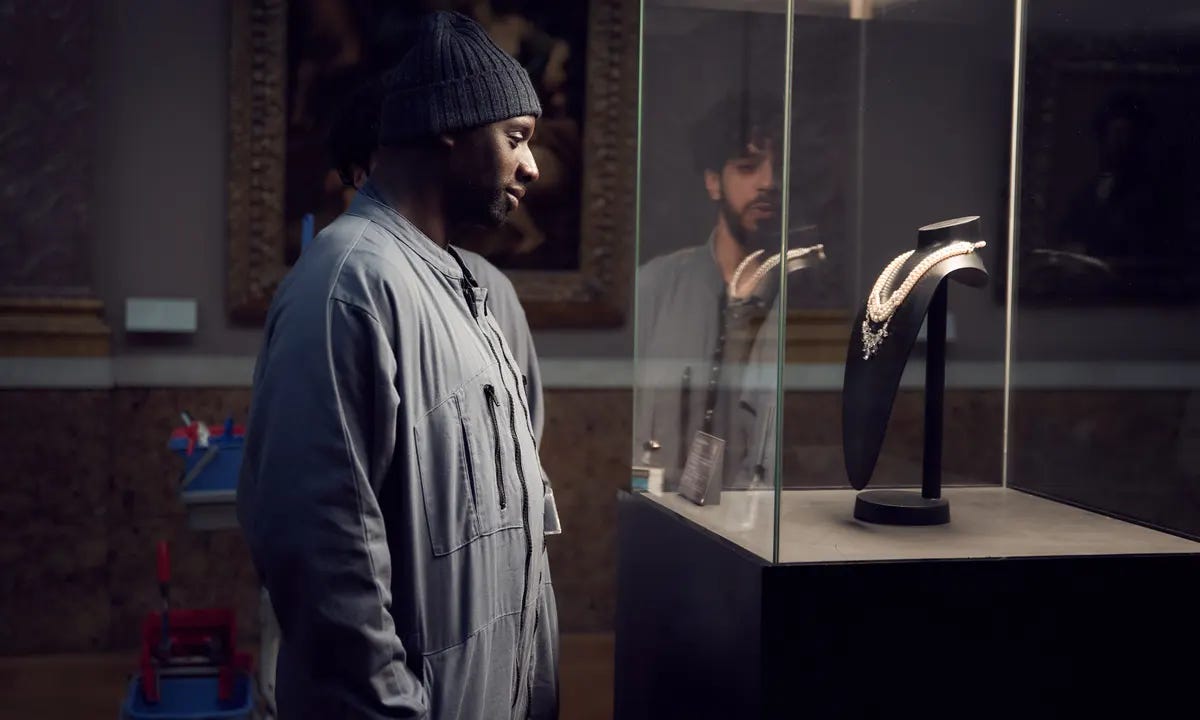'Lupin' and Scandalous Code-Switching
Watch a flick, illin' and rootin' for the villain.
Jay-Z said, “I’ll tell you half the story, the rest you fill it in/Long as the villain win.” And Lupin, which I just binged this past Sunday, seconds that suspenseful (and cheerfully transgressive promise): the “chapters” are fetching enough to make you feel like a co-author. Why do we even want villains to win? Because, when rendered correctly, with the appropriate nuance (as are Reasonable Doubt's version of Hov and Lupin's Teflon Assane Diop), they mimic our hidden rebellious underpinnings.
Throughout 10 episodes, you vicariously experience the thrill of the getaway, the rush of having pulled off a glorious heist. Diop’s seamless assimilation into society feels enticing as we wrap up each scandalizing season and return to our first-world routines.
Our culture has been "anti" since the '60s—the clunky balance of radicalism and wholesome mainstream entertainment. Lupin is nowhere near high art (nor does it try to be); it's about a savvy immigrant (thrillingly, illicitly) “negotiating” with the gatekeepers of high art.
Greater antiheroes (from far richer series) never make it out of, say, Baltimore or New Jersey. Marlo wins but is still on that corner (in a prim, albeit bloody suit). Tony either suffers through a family dinner or gets whacked; either way, he’s right around the way where anyone in a stupid jacket can get to him. The Wire is about the system's prevalence, and The Sopranos is about the mob-world's “permanent government,” even if that institution (helmed by a guilt-ridden family man) sensationally declines. We may empathize with Avon or Stringer, but we don’t exactly root for them. Tony is impossible to root for when he's chowing Ameritti after offing someone—we, instead, relate to the all-too-American family dynamics, incidentally, fueled by jarring depictions of excess.
Maybe a diplomatic crook is the only kind we can relate to. Viewers loved Omar Little (who moved to Puerto Rico). But every dealer in Baltimore loathed him. And he ends up dead in a corner bodega. In one episode, Omar sports an “I Am the American Dream” tee. That phrase—summing up so much about the feted antihero—sounds like a long-lost Biggie quotable. He, like Omar, kind of made it out. Crucially, Jay-Z on 2007’s “Pray” says, “Close your eyes and you could pretend your me/A cut from the cloth of the Kennedy'/Frank Sinatra having dinner with the Genovese.” Who doesn’t idolize* a former drug kingpin who regularly hobnobs with Obama?
Seeing a Black man getting away with everything but murder (slinking past the authorities, smirking in a fresh pair of Jordans) is exciting. It’s not exactly Prestige TV (the whole getting away with it part suggests that Diop differs from the villains in Baltimore and Jersey). Still, Lupin depicts a provocative revenge story. Diop robs the 1 percent, then crashes exclusive auctions before returning to his tony Parisian home. The world’s fortunes (which most of us in some way desire) are usually ill-gotten. What’s better than flauntingly taking from the takers?
*I hesitate to invoke the word “idolize” in any sentence referring to drug dealing, which can’t in any way be condoned. That said, the corner-boy-to-Obama chum narrative is, in some ways, admirable—not because Jay used to sell drugs, which he’d be the first to admit was soul-killing, but because he’s, these days, a legitimately inspiring figure.


